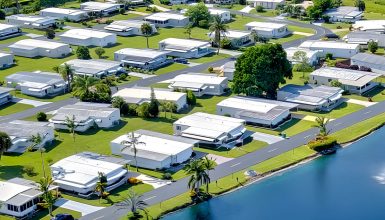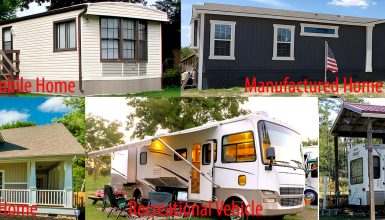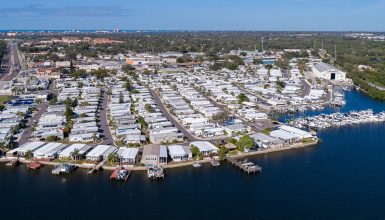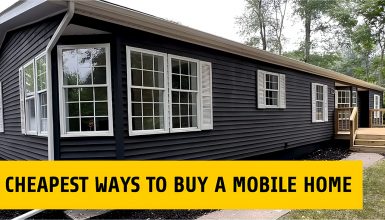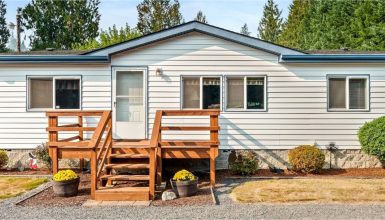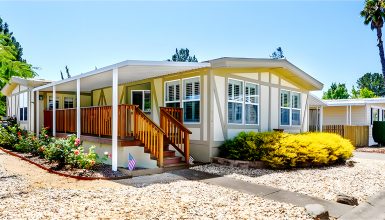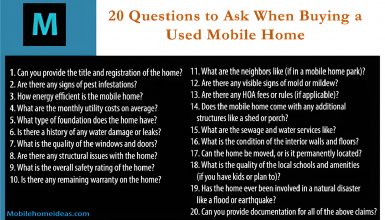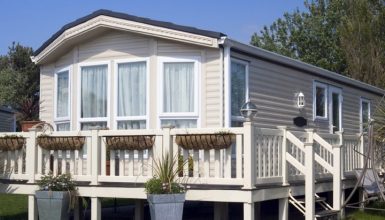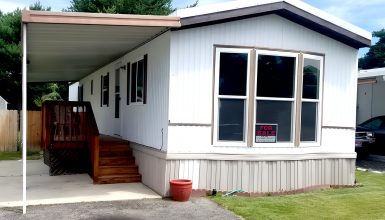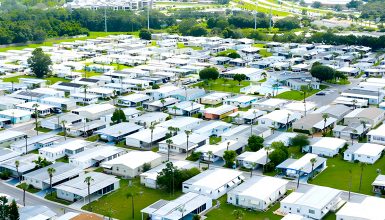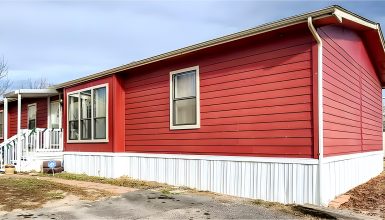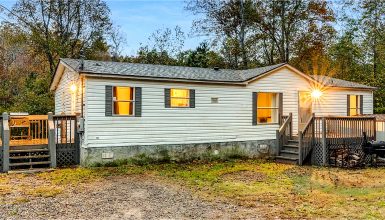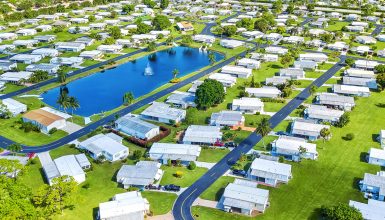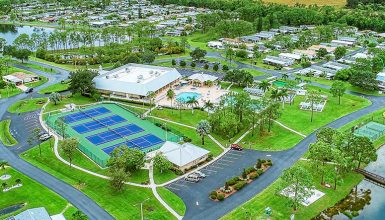Buying a used mobile home isn’t a decision to take lightly. This charming, flexible, affordable housing option offers a chance to break free from traditional real estate. Still, it does come with its own set of considerations. Let’s prepare you to navigate the ins and outs of buying a pre-loved mobile home. We’re here to guide you through everything from budgeting to inspections and every step in between. It’s time to make your dream of mobile home ownership a reality. So, strap in, and let’s get this journey started!
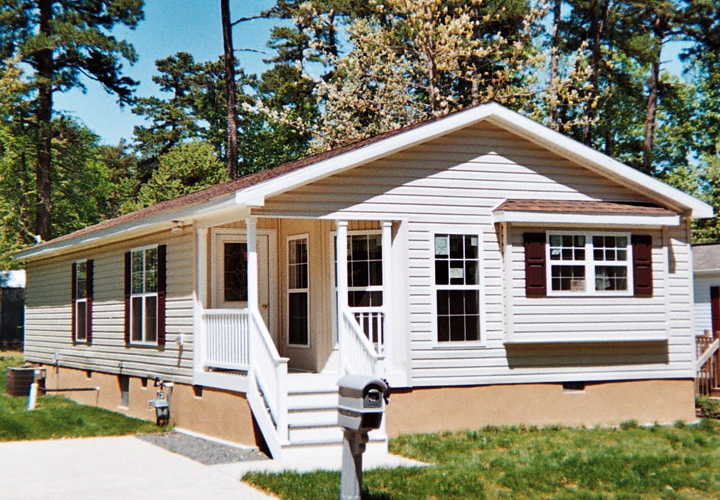
1. Budget
Money talks, right? Your budget is the megaphone. Let’s take a close look at those dollars and cents. We aren’t just talking about the sticker price of the mobile home here. Oh no, there’s a bit more to it.
First up is the home’s price tag. That’s your starting point. What can you afford without breaking the bank? Have you got a number? Great! But hold on, don’t stop there. You’ve got to think bigger picture.
Here’s where it gets interesting. You need to factor in those sneaky, less obvious costs. Think along transportation lines (yes, mobile homes sometimes need to move), installation, site preparation, and utility hookups. These costs can add up, so don’t let them catch you by surprise.
And let’s not forget, if you’re placing your new-to-you mobile home on a leased lot, there’ll be monthly lot rent. You’ll want to include that in your budget as well.
Considering these expenses now, you’re doing the future a big favor. You won’t just be a mobile home owner but also savvy and financially stable. And let me tell you, that’s a fantastic feeling!
2. Location
Location, location, location! You’ve probably heard that old saying, and let me tell you, it holds up, especially when choosing a spot for your mobile home.
First, decide if you want your mobile home to stay put or if you might want to relocate. If you’re dreaming of flexibility, a leased lot in a mobile home park could be your best bet. These places often come with excellent amenities like pools or community centers. Plus, they offer the freedom to hitch up and roll out when the open road calls your name. But remember, that freedom comes with a price tag – monthly lot rent.
However, if you’re craving a slice of the earth to call your own, you might want to buy a plot of land. Imagine your own backyard, no neighbors right on top of you, and the freedom to landscape to your heart’s content. Sounds dreamy, right? But be aware zoning laws can be tricky, so you’ll need to make sure mobile homes are allowed on your chosen plot.
Consider the practical aspects, whether you go for a lot or your own land. How’s the commute to work or school? Are there grocery stores, medical facilities, and entertainment nearby? Is the area prone to flooding or other natural disasters? These factors can significantly impact your day-to-day living.
Choosing the right location for your mobile home is like setting the stage for an excellent performance. It’s all about creating a harmonious backdrop for your life’s scenes. So take your time, do your homework, and find that perfect spot that says ‘Home Sweet Home.’
3. Size and Layout
Now, let’s talk about size and layout. No, we’re not chatting about a pair of jeans; we’re still talking about your future mobile home. And just like a pair of jeans, it’s all about finding the right fit.
Think about your lifestyle. Are you a social butterfly who loves hosting friends and family? A single-wide mobile home with an open layout might be your cup of tea. Do you work from home? Maybe a double-wide model with extra room for an office is what you need. Have a big family? A triple-wide mobile home with multiple bedrooms and bathrooms is likely on your wish list.
Remember, a mobile home isn’t just about square footage. The layout, or floor plan, is super important too. It’s the difference between a space that flows and one that feels cramped. Do you like an open-concept kitchen or one tucked away? Do you need a lot of storage space? How about a master bedroom with an en-suite bathroom? All these details count.
Consider your furniture too. That king-sized bed or extra-large sofa needs space. Make sure the rooms can accommodate your furniture and still leave room to move around comfortably.
Choosing the right size and layout for your mobile home is like composing a beautiful song: every note, every pause, every crescendo matters. So, sketch out your needs, wants, and non-negotiables.
3. Inspecting the Condition of the Mobile Home
Ready to play detective? Now’s the time to inspect the condition of the potential mobile home. Put on that Sherlock Holmes hat because you’ll need to dig deep and look at everything.
- Roof
Start at the top with the roof. Is it in good shape? Any signs of leaks or water damage? What about sagging? These could be red flags, signaling that repairs might be needed.
- Siding and Skirting
Next, it’s time to face the siding and skirting. Is it straight and sturdy? Look out for cracks or water damage. These could hint at structural problems that could cost a pretty penny.
- Floors
Don’t forget the floors under your feet. They should be firm and level. Any soft spots? That could mean water damage or structural issues.
Now, test those windows and doors. Do they open and close smoothly? Are there any drafts that might suggest leaks?
While you can do a pretty good inspection, a professional could spot things you might miss. They’re trained to sniff out issues like structural damage, mold, or problems with the electrical or plumbing systems.
4. Checking the Plumbing and Electrical Systems
Ready to shed some light on the inner workings of your potential mobile home? Now we’re getting into the plumbing and electrical systems. Think of them as the veins and arteries of your home, crucial for keeping everything running smoothly.
- Plumbing
First, the plumbing, turn on all the taps. The water should run clear, not brown or cloudy. Flush the toilets to ensure they’re working correctly. Any leaks under the sinks? A small leak can become a big problem if left unattended.
- Electrical system
Now, onto the electrical system. Flick all the switches to make sure the lights are working. Check the outlets with a small appliance. You don’t want any surprises the first time you plug in your coffee maker! Look at the electrical panel too. Are the circuits marked? Is there room for expansion if needed?
The plumbing and electrical systems are usually behind walls and under floors. Still, they’re vital to a comfortable, safe home. Problems in these areas can be expensive to fix, so you want to catch any issues now.
Don’t be shy. Turn on those taps, flip those switches, and get a feel for how the heart of your future home beats. Your due diligence now can save you a world of hassle later.
5. Evaluating the Appliances
Next stop on our mobile home adventure? The land of appliances. Now, if the home comes with them included, you’ve hit the appliance lottery! But don’t start celebrating just yet. We need to make sure they’re up to snuff.
- Kitchen Appliances
Let’s start in the kitchen. Fire up that stove and make sure all the burners are working. Check the oven, too. Any weird smells or smoke? That’s a no-go. Open the fridge and freezer. Are they cold? Any unusual noises? You want fresh food, not a fresh repair bill.
If there’s a dishwasher, run a quick cycle. Does it fill, wash, and drain properly?
- Laundry room
Don’t forget the laundry room. Run a short cycle on the washer and dryer. You want clean and dry clothes, not a flood or clothes that never dry.
These appliances are key to making your home life comfortable. The last thing you want after moving in is to find out you can’t cook dinner or wash your clothes.
And hey, remember this – you’re not just buying appliances. You’re buying time and convenience. Ensuring they’re all in working order now will save you a lot of trouble later. Because who wants to spend their first week shopping for appliances or calling repair services in a new home?
So, flip those switches, turn those dials, and ensure everything runs smoothly. Your future self will thank you!
6. Assessing Heating and Cooling Systems
Ever tried to sleep in a too-hot room or shivered your way through a movie in a too-cold living room? Not fun, right? That’s why we will discuss your potential mobile home’s heating and cooling systems.
These systems are your frontline defense against mother nature’s mood swings. So, let’s ensure they’re up for the challenge.
If you’re inspecting the home during winter, crank up the heat. Does it warm up evenly throughout the home? No cold spots hiding in the corners, right? And in summer, flip on the air conditioning. It should cool the home effectively without sounding like a freight train.
Check out the furnace and air conditioning units. Are they in good shape? If they’re older, you may need to replace them soon, which can be pricey.
And don’t forget about insulation. A well-insulated home helps your heating and cooling systems work more efficiently, saving you money on energy bills.
Remember, you want your mobile home to be a cozy retreat, no matter the weather outside. Ensuring your heating and cooling systems are in top shape will keep you comfy all year round.
So, turn up the heat or chill out with the AC. After all, a comfortable home is a happy home. And you deserve nothing less!
7. Inspecting the Insulation
Get ready; we will talk about the unsung hero of a comfortable mobile home – insulation! You might not see it, but you’ll feel it. Or rather, you’ll feel its absence if it’s not up to par.
Proper insulation is like your home’s best-kept secret. It keeps the cool air in summer and the warm air in winter. The result? A comfortable home and lower energy bills. Win-win, right?
Check the insulation in the walls, floors, and especially the roof. You’re looking for any signs of dampness, mold, or pests. These could indicate problems that might need attention.
If possible, find out the insulation’s R-value. That’s a measure of its thermal resistance. The higher the R-value, the better the insulation. Thanks to their thin walls, mobile homes typically need higher R-values than traditional homes.
Also, inspect the windows and doors. Are they well-sealed? Drafty windows or doors can let in the cold or heat, making your insulation work overtime.
Remember, excellent insulation isn’t just about comfort. It’s about energy efficiency, cost savings, and even reducing noise. So, make sure to give this invisible powerhouse the attention it deserves.
8. Examining the Home’s Undercarriage
Alright, we’ve checked out the inside. Now let’s step outside for a bit. No, we’re not done yet. It’s time to examine the undercarriage of the mobile home. This isn’t the glamorous part, but it’s just as important.
Think of the undercarriage as the foundation of a traditional house. It’s what keeps your home stable and safe. So, it’s crucial to ensure it’s in top-notch condition.
Get down there and check the beams and joists. Are they solid and free of rust or rot? That’s what you want to see. Now, look for the belly wrap, the protective cover under the home. It should be intact, without any holes or tears.
While there, see if you can spot the insulation and vapor barrier. They should be in good condition, with no signs of dampness or pests.
And here’s something you might not have thought of – the ground beneath the home. It should be dry and well-drained. You don’t want standing water around your home. That could lead to dampness and mold.
Crawling under a mobile home might not be your idea of a good time. But think about it this way – you’re not just looking at beams and wraps. You’re ensuring the stability and longevity of your future home.
So, grab a flashlight, get dirty, and give that undercarriage the attention it deserves. Your future home is counting on you!
9. Understanding the Title
Time to talk titles. No, not the kind you’d find in a library or at the beginning of a movie. We’re talking about the title of your potential mobile home. It’s the official document proving you’re the owner, like a birth certificate for your home.
First, make sure the seller has a clear title. That means there are no liens or back taxes owed on the home. Because nobody wants to inherit a debt, right?
The title will also give you important information about the home. It’ll tell you the make and model, the size, and the year it was built. This is like the home’s ID card.
The title will be transferred to your name when you buy the home. Keep it in a safe place. You’ll need it if you ever decide to sell the home.
Remember, buying a mobile home isn’t just about choosing the perfect layout or checking the plumbing. It’s also about understanding the legalities, like the title. It’s all part of the adventure of homeownership.
So, don’t be intimidated by legal jargon or official documents. Understanding your mobile home’s title is vital to becoming a savvy homeowner. You’ve got this!
10. Mobile Home Park
Next up, we’re focusing on the mobile home park. Because while your mobile home might be your castle, the park is your kingdom. And just like any good monarch, you’ll want to know about your domain.
First up, meet the neighbors. Are they friendly? Do they keep their homes and yards tidy? You’re not just buying a home. You’re joining a community. You want it to be a good fit for you.
Next, find out about the park rules. Are there quiet hours? Pet policies? Parking rules? Make sure you’re comfortable with these guidelines. After all, they’ll shape your daily life in the park.
What about the amenities? Is there a community pool or clubhouse? Parks or playgrounds? These shared spaces can boost your quality of life.
Also, find out about the lot rent. This is the monthly fee you’ll pay for your spot in the park. It usually covers things like trash pickup, water, and sewer services.
And don’t forget to check out the surrounding area. Are there grocery stores, schools, or healthcare facilities nearby? Your life extends beyond the park, so it’s important to know what’s available.
Remember, your home extends beyond its four walls. The park and community are all part of the package. So, take the time to learn about them. Who knows, your perfect mobile home might be in the perfect park, surrounded by soon-to-be friends. It sounds like a dream come true, doesn’t it?
12. Insurance
Next is a crucial piece of the puzzle: securing insurance for your new mobile home. Think of it as your home’s safety net, ready to catch you if any unexpected mishaps occur.
First, you must decide on the coverage that best suits your needs. Policies can range from basic, covering things like fire and theft, to more comprehensive ones that include water damage and liability coverage.
Don’t forget to consider the replacement cost versus the actual cash value. Replacement cost policies will cover the cost of replacing your home and belongings. At the same time, actual cash value policies take depreciation into account.
Take some time to shop around and compare rates from different insurers. And remember, the cheapest policy isn’t always the best. Knowing your home and belongings are well-protected, you want coverage that gives you peace of mind.
Oh, and one more tip! Make sure you understand what your policy covers and what it doesn’t. Don’t be afraid to ask questions. After all, knowledge is power!
13. Financing
Lastly, it’s time to talk about financing. But don’t worry. We’ll break it down together, one step at a time. First off, know your options. Mobile home financing can be a bit different from traditional home loans. You might go with a personal loan, a chattel loan specifically for mobile homes, or even a mortgage, depending on whether you own the land your home will be on.
The key is finding the right fit for your budget and circumstances. Take the time to compare interest rates, terms, and fees from different lenders. And remember, it’s not just about the monthly payment. Consider the total cost over the life of the loan.
And here’s an insider tip: check out any special programs for mobile home buyers. You might be pleasantly surprised at what’s available.
Next, get your paperwork in order. Lenders will want to see things like proof of income, credit history, and details about the home. Get it all together ahead of time to make the process smoother.
Finally, remember this is a big commitment. Take your time. Ask questions. Understand the fine print. This isn’t just about buying a home. It’s about creating a secure, comfortable future.
Conclusion
Well, look at how far we’ve come! We’ve covered everything from understanding budgets to inspecting undercarriages, securing insurance, and arranging financing. You’re now armed with the knowledge you need to confidently buy a used mobile home. Thank you for reading!

